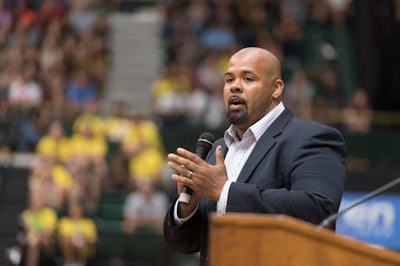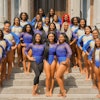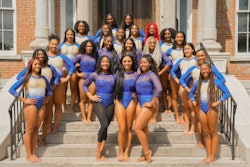Having grown up in Dallas, Tx., Dr. Albert Bimper Jr.’s experience attending Colorado State University (CSU) as an undergraduate was “very different” racially and culturally, he says. While some of his experiences as a student athlete were positive, at other times, it was challenging.
“I tell students now, my transcript didn’t point towards doctor,” Bimper recalls with a laugh. “It took a lot of support and a lot of thought.”
The then-NFL-bound student continued to navigate the spaces of the university as a Black male football player until he injured his hamstring during a Thursday night game his senior year. One Black professor pulled him aside and asked him, “Now what?”
Bimper says the professor helped him walk through the process of “Plan B,” keeping him under his wing when Bimper’s football dream started to fade away. This professor “had higher expectations for me, other than being a football player on this campus, and I appreciated that,” he says.
After graduating from CSU in December 2005, Bimper deferred his graduate studies at Purdue University for a year, and had a “cup of coffee” in the NFL, playing for the Indianapolis Colts, he says, referring to his brief stint in the league. His rookie year ended up being a Super Bowl year.
Once the 2006-2007 season was over, Bimper decided to return to Purdue for his master’s degree and to take up a graduate assistantship coaching. He found that the experience working with student athletes of color at West Lafayette, Indiana, paralleled his own as a student back in Fort Collins, Colorado.
“That really intrigued me about how do I better serve these student athletes, particularly student athletes of color, in ways that aren’t just coming from the voices of coaches,” Bimper says. A question he considered was, “How do we restore the kind of humanity to these student athletes’ experiences?”
Both his master’s and then his doctoral work at the University of Texas at Austin (UT Austin) explored the range of experiences, identities and values of student athletes of color and how race and class intersect with a student athlete’s development and academic outcomes.
Bimper’s mentor at UT Austin, Dr. Louis Harrison, says that, while many of his students completed their Ph.D. in four years, Bimper completed his in only three. Harrison, who is the Charles H. Spence Sr. Centennial Professor in Education at UT Austin, wondered if, because Bimper was coming in as an ex-professional football player, there might be some “ego problems.”
“But it was quite the opposite,” he says. “Every morning when I came in, Albert would beat me here. He’s already here, already working, asking lots of questions … which I think helped him to not only finish his coursework and get his degree earlier than most, but I think it’s made him an outstanding researcher.”
Some of Bimper’s published research can be found in The Journal of Black Psychology; Journal of College Student Development; Journal of Sport & Social Issues; Race, Ethnicity and Education and Quest.
In his current role, Bimper’s perseverance, tenacity and personal experience have allowed him to serve in dual roles, as an athletic director in charge of diversity and as an associate professor in the Ethnic Studies Department at Colorado State.
While it may look slightly different than a classroom setting, Bimper grounds the programming of the athletic department, using ideas of thoughtful curriculum and pedagogy. One program, the John W. Mosley Athlete Mentoring Program at CSU, partners with the Black Culture Center and student affairs administrators on campus, bringing mentors and former athletes of color to engage in discussions about race, identity or current political topics, such as the tradition of protesting.
Because CSU is a land-grant institution, Bimper spent the past semester talking with students about being Black in the field of agriculture and its connection to the Black community, such as in addressing food insecurities or the Flint water crisis.
And his courses, such as “Racial Representations of Black Athletes,” look at how Black sports figures have been “constructed at the interface of whiteness and White supremacy and how they’ve navigated that space,” Bimper says. His academic mentor has called his work unique and outstanding.
Bimper hopes to model that student athletes have a range of interests and that they are “more complex than sometimes people want us to be,” he says.
Students have come to Bimper for advice on multiple occasions, including after the Missouri protests and the NFL kneeling protests. “I try to offer a critical lens to our student athletes and to our campus and anybody that’s willing to listen about what I think, and how one might view those situations,” Bimper says.
In an effort to support students and student athletes, he attempts to “build a bridge from the Ivory academic tower” to actual implementation and practice of his theoretical work and pedagogy.
“We didn’t have a chief diversity officer when I was a student here and now we do,” Bimper says. “And now we have a few different individuals such as myself trying to do the work. The conversation is constantly happening.”
Albert Yves Bimper, Jr.
Title: Senior Associate Athletic Director for Diversity, Inclusion & Engagement and Associate Professor of Ethnic Studies, Colorado State University
 Dr. Albert Yves Bimper, Jr.
Dr. Albert Yves Bimper, Jr.Tenured: Yes
Education: B.S., Colorado State University; M.S., Purdue University; Ph.D., University of Texas at Austin
Age: 34
Career mentors: Dr. Louis Harrison, University of Texas at Austin; Dr. Alan L. Smith, Michigan State University
Words of wisdom/advice for new faculty members: “Be curious and be brave to ask the questions.”



















